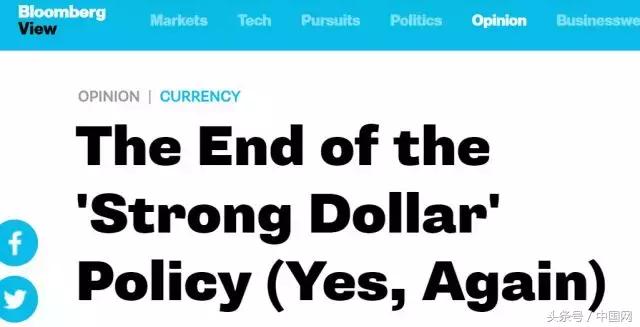
After the Federal Reserve hawkish interest rate hike and Trump's tax reform policy failed to boost the U.S. dollar, the U.S. government's meltdown last weekend made the U.S. dollar worse.
On January 24, during a Davos forum in the United States, U.S. Treasury Secretary Mnuchin made it clear that he did not worry about the dollar in the short term because a weaker dollar is good for U.S. trade and economy.
This speech instantly inspired the foreign exchange market panic, the night the dollar index fell more than 1%, which is the first time in three years the dollar index below 90 integer mark. As of 21 January at 21:00, the US dollar index hovered around 89.02 and once fell to 88.80, its lowest level in three years.
US "deliberately let the dollar fall"?
On the 24th, the U.S. finance minister Mu Ninqin said at the forum press conference that he will not worry about the dollar in the short term. "Obviously the weaker dollar will benefit U.S. trade and opportunities." He added that in the long run the strength of the U.S. dollar will depend on the strong recovery of the U.S. economy, which will remain the primary reserve currency.
Bloomberg News quoted Mizuho Bank analysts as saying that Muhinqin's speech was like "a blockbuster" shocking the entire market. "For the first time in a long time, the U.S. finance ministers have openly opposed the strong dollar." In fact, U.S. government officials have always been cautious on the U.S. dollar exchange rate, but this time it is a bit unrealistic.
Although later U.S. Secretary of Commerce Rose explained in an interview with CNBC that Nucqin "did not advocate a weaker dollar." The White House spokesman also said that "the U.S. dollar is very stable at present." However, the market did not dispel the U.S. currency war "Concern, therefore, the dollar plunged, the global currency have gone up, gold rose.
Bloomberg said the U.S. dollar is likely to weaken further in the future due to the uncertainties in the U.S. economy and the relative recovery of advanced economies such as the EU, the UK and Japan.
RMB exchange rate hit a new high of more than two years
Affected by this, the appreciation of RMB against the U.S. dollar continues. On the 25th, the central parity rate of RMB against the U.S. dollar was reported at 6.3724, a rise of five consecutive trading days, the highest since mid-November 2015. Starting at 6.5079 January 2, RMB has risen by about 2.08% against the U.S. dollar this year, based on median prices.
Onshore, however, offshore RMB (against the U.S. dollar) also rose appreciably yesterday, breaking even multiple thresholds. According to SINA data, the spot exchange rate of RMB against the US dollar (CNY) hit an all-time high of 6.3135 on January 25, higher than the closing price of 6.323 on August 11, 2015 (the start of exchange reform).
U.S. trade protectionism is warming
At present, the world's major economies trade surplus with the United States. Given the high U.S. trade deficit, the depreciation of the U.S. dollar will help reduce the deficit. If the tax cuts and the collection of the safeguard tariffs are adopted, the impact on global trade can be imagined.
Some commented that the recent U.S. global investigation of photovoltaic products and large washing machines was the first of its kind in the trade war and that the United States prepared at least 156 trade measures against China.
On January 22, the U.S. Trade Representative Office announced that with the approval of President Trump, the United States will impose a safeguard tariff on imported washing machines and photovoltaic cells and components.
As the United States imported washing machines mainly from South Korea, South Korea is expected to suffer the most serious impact. In terms of photovoltaic cells and modules, according to Bloomberg's summary of ITC statistics, the largest source of photovoltaic products in the United States is Malaysia with a share of 36%. Products from China account for 8% of total imports.
Ministry of Commerce: China will resolutely defend its own legitimate rights and interests
This rare unilateralism has aroused public concern over the escalation of trade protectionism in the United States.
In response, Foreign Minister Wang Yi attended the China-Latin America Forum in San Diego on the 23rd of this local time. He said that the market is not robbed of but expanded.
Foreign Ministry Spokesman Hua Chunying also pointed out at a routine press conference on the 24th that trade protectionism is a "double-edged sword" that will hurt itself while stabbing others. I do not know if there is any legendary "hedgehog" in the world that can guarantee that a country is free to wave the stick of protectionism to other countries without any damage?
Ministry of Commerce spokesman peak in the 25th said cooperation is the only correct choice for both China and the United States. China will take all appropriate measures to resolutely defend its legitimate rights and interests with respect to unilateralism and protectionism that do not conform to the WTO rules.